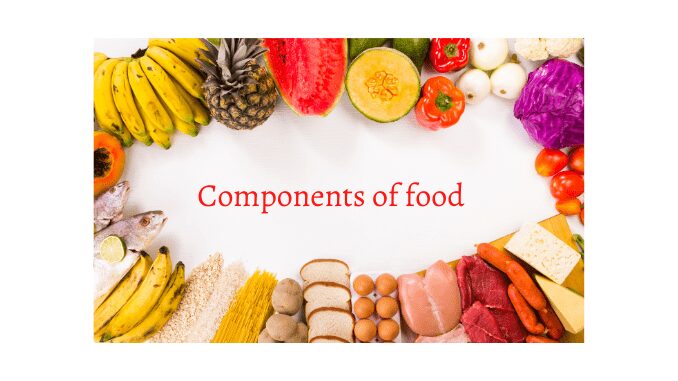
Introduction
Food is essential for our growth and overall nutrition. Different types of foods provide different kinds of nutrients required for good health and efficiency. Food is composed of various components, including important nutrients that serve vital functions in the human body. Therefore, in this discussion, we will explore the main components of food and their effectiveness in human nutrition.
Simply eating food does not always guarantee the expected results, as improper digestion can lead to inadequate nutrition. Both plants and animals are sources of food that enter our body, nourish it, satisfy hunger, and energize it. Components of food are mainly divided into two main categories namely macronutrients and micronutrients. Let us explore all the components and their functions (1).
The main components of food
There are different types of components in food. These food components or nutrients are mainly divided into two types.
1. Macronutrients
The macronutrients or components of the food are carbohydrates, proteins, and fats. These nutrients are found in large quantities in food charts. Macronutrients play an active role in the formation and growth of the body. These components also provide the necessary energy to the organism and increase body weight. Although water does not produce energy, water is also called the main component because of its importance in the body (3).
2. Micronutrients
Besides the macronutrients, there are two other nutrients in the food called vitamins and minerals. They are called micronutrients because these components are present in small quantities. Micronutrients are essential for body function and physical well-being. They are required in very small quantities and help in controlling physiological functions and protecting the body from various diseases. These nutrients are also called accessory factors (3).
So based on the above information, there are six nutrients present in food. These are carbohydrates, proteins, fats, vitamins, minerals, and water. The function of all these components in human nutrition is discussed below.
1. Carbohydrates
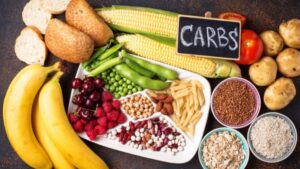
The major form of food which we are consuming every day is carbohydrates. They are organic compounds made up of the elements like carbon, hydrogen, and oxygen. The ratio of hydrogen and oxygen in this organic compound is 2:1. The symbol of carbohydrates is C₆H₁₂O₆. That is one carbohydrate has 6 carbon atoms, 12 hydrogen atoms, and 6 oxygen atoms (2) & (5).
-
Sources
Carbohydrates are found in both plants and animal sources. Rice, wheat, cereals, millet, pulses, nuts, roots, potato, flour, molasses, sugar, sago, grapes, corn, bananas, mangoes, watermelons, vegetables, carrots, oranges, dates, apples, barley, goat liver, cow’s and buffalo’s milk, etc. are the sources of carbohydrates (4).
-
Classification
According to the composition, there are three types of carbohydrates.
1. Monosaccharide
The carbohydrates that are made up of a single molecule of carbon are called monosaccharides. For example, glucose, fructose, and galactose are these types of carbohydrates. Glucose is found in honey, sweets, and fruits. Fructose is found in fruits, honey, and root vegetables. Galactose is found in milk.
2. Disaccharide
The carbohydrates that are made up of two molecules are called disaccharides. Such as sucrose, lactose and maltose. Sugarcane, molasses, sugar, and date juice contain sucrose, germinated seeds contain maltose and milk contains lactose.
3. Polysaccharide
The carbohydrates that are made up of many molecules are called polysaccharides. For example, starch, glycogen, and cellulose are these types of carbohydrates. Rice, wheat, potatoes, sweet potatoes, etc. are rich in starch. Cellulose is found in fruits, vegetables, fruit peels, and seeds. And glycogen is found in muscles and the liver (4) & (6).
-
Function
The role of carbohydrates in human nutrition is quite important.
- The main function of carbohydrates is to produce heat and energy in the body.
- Carbohydrates help in the combustion of fats.
- Cellulose-type food eliminates constipation in the human body.
- Excess carbohydrates are stored in the body in the form of glycogen.
- These organic molecules protect against ketosis.
Carbohydrates are very significant molecules in the human body. Starch is a type of carbohydrate. The lack of carbohydrates in the human body causes various diseases. like ketosis and marasmus disease are often seen in children.
Excessive intake of carbohydrates leads to the accumulation of fat in the body. As a result, there is a risk of weight gain, high blood pressure, diabetes, heart disease, etc. (3).
2. Proteins
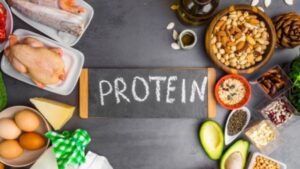
Proteins are organic compounds that are made up of carbon, hydrogen, oxygen, and nitrogen. All plant and animal cells are made of protein. They are composed of different types of amino acids. According to the chemical composition, there are three types of protein. These are simple proteins, conjugated proteins, and derived proteins (3).
-
Sources
Proteins are found in fish, meat, eggs, milk, pulses, soybeans, beans, wheat, etc. Cereals, millet, potatoes, green vegetables, and fruits have very little amount of protein (1).
-
Function
- The first and primary function of protein is to assist in the formation of the structure of the body.
- One of the functions of protein is to meet the demand for essential amino acids.
- Proteins create new cells to replenish the body’s decay.
- Most of the bones, muscles, organs, systems, blood cells, etc. of the body are made up of proteins.
- It plays a major role in the production of antibodies in the body.
- When the body lacks carbohydrates and fats, the stored protein is broken down to produce heat and energy.
- Hemoglobin in the blood is made up of proteins (5).
3. Fats
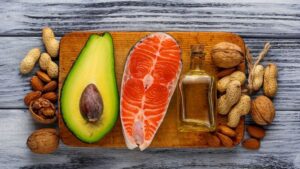
Like carbohydrates, fats are made up of carbon, hydrogen, and oxygen. However, their structure and proportions are different. Fats are digested and converted into fatty acids and glycerol. Fat does not mix with water and thus floats in water. Fatty acids and glycerol are excreted through the small intestine. According to the structural properties, there are three types of fats, simple fat, compound fat, and derivative fat (1) & (3).
-
Sources
Fats are found in meat fat, butter, ghee, whole milk, ice cream, nuts, oil, red meat, cheese, coconut oil, palm oil, cream, mustard oil, oilseeds, etc. (2).
-
Function
- Fat is a concentrated source of heat and energy. 9 kcal energy is obtained from 1 gm of fat.
- This organic compound protects the human body from skin diseases by providing essential fatty acids.
- Fat is stored in the animal’s body as a source of food for the future.
- It helps to dissolve and absorb vitamins A, D, E, and K.
- It lubricates the rectum and anus and helps in the excretion of feces.
- Fats (cholesterol) produce vitamin D, hormones like testosterone, estrogen, etc. (2) & (5).
4. Vitamins
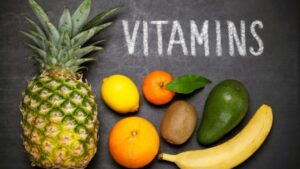
Vitamins are those special organic nutrients that help the body to grow normally and increase immunity. There are two types of vitamins water-soluble vitamins (vitamin B complex, C, and P) and fat-soluble vitamins (vitamin A, D, E, and K). The sources of all these vitamins and their function are discussed below (1).
-
Sources
Liver oil of cod and halibut, fish, egg, whole milk, carrot, butter, ghee, vegetable oil, rice, flour, yellow pumpkin, mango, tomato, papaya, cabbage, green vegetables and leaves, nuts, peas, spinach, lemon, cauliflower, etc. are rich in vitamins (3).
-
Function
- The functions of vitamins are to increase the normal growth of the body, build blood cells, keep the mucous membrane healthy, keep the nerve cells healthy, etc.
- Vitamins build rod cells, boost immunity, and keep gums healthy.
- It keeps the amount of prothrombin in the blood normal and helps in blood clotting.
- Vitamins help in breast milk secretion, infertility prevention, fetal growth, etc.
- It keeps the skin soft and normal.
- Vitamins help maintain the retinal structure and eye performance (3) & (5).
5. Minerals
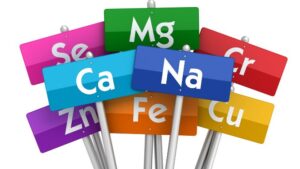
Minerals are an important component of food. Various minerals are needed to keep the body healthy. There are about 24 types of minerals in the body. Some of these are important in nutrition. The important minerals for the body are calcium, sodium, iron, phosphorus, iodine, potassium, and chlorine. Adequate amounts of minerals are required in the daily diet. Especially the presence of calcium, iron, and iodine in the diet (1) & (6).
-
Sources
Milk, fish, meat, green vegetables, eggs, pulses, nuts, grains, liver, cod liver oil, seaweed, table salt, cheese, fish liver oil, etc. are rich in minerals (2).
-
Function
The function of minerals in the human body is essential.
- Minerals help in bone formation and nutritional maintenance.
- These elements participate in the formation of teeth.
- Minerals help build energy from carbohydrates and fats.
- It makes red blood cells.
- The function of minerals is to maintain the balance of water inside and outside the cell.
- It helps in muscle building.
- Minerals affect the normal growth of bones, skin, hair, and the normal structure of the brain, the physical and mental development of the human body.
- It is an inorganic component of food and is an essential element. It does not provide energy. When the human body is deficient in minerals, various diseases occur. Such as, a lack of iodine causes goiter. This anger swells the front of the throat. A lack of iron in the food reduces the amount of hemoglobin in the blood. As a result, anemia occurs (3) & (6).
6. Water
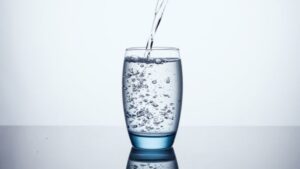
Water is an essential and important component of food. Body structure and internal function cannot occur without water. About 60 to 70% of body weight is water. The human body needs water for the formation of every organ-like blood, flesh, nerves, teeth, bones, etc. (1).
-
Function
The role or function of water in the human body are
- The body needs water for the digestion of foods.
- Water is necessary for all the chemical processes in the body.
- The function of water is to transport the necessary elements of the body to the cell.
- Water eliminates constipation.
- Water helps in controlling body temperature.
Above all, the importance of water in the human body is immense. So lack of water causes various diseases in the body. Dehydration can occur in many ways in the body. Water is constantly excreted from the human body along with sweat, and urine. In addition, water is excreted from the body through diarrhea, vomiting, etc as a result, the volume of blood is decreased, the tongue becomes dry, and the skin becomes wrinkled. Above all, low water intake also causes kidney problems (2).
